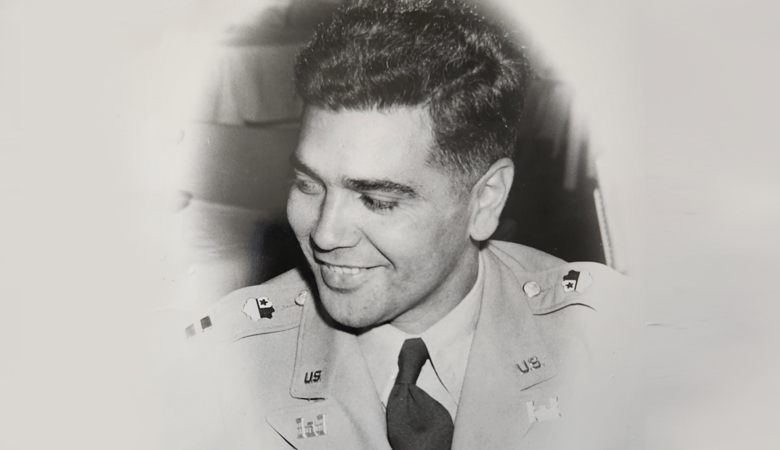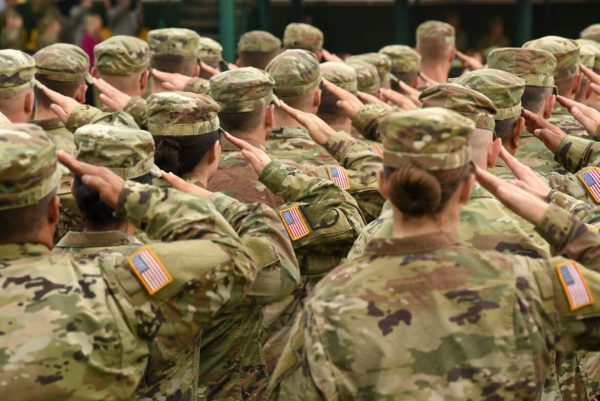
Carol C. Cannata’s uncle was a decorated war veteran and one of the architects of our nuclear navy.
On December 8th, we received notification that Carol’s uncle, Angelo Giambusso passed away. The funeral was held one week later. Many people had to travel considerable distances to be there, as the Catholic funeral mass was in Andover, Massachusetts.
Angelo’s son Scott reached out to me shortly after we learned about his father’s passing and asked if I would deliver the eulogy. It was my honor to accept. After writing what was to be delivered, I thought it would be a fitting veteran’s article as one was due for this February issue. What I presented on that incredibly sad day is what you are about to read. After you read it, I hope you will agree that Angelo Giambusso was an American hero.
How do we describe who Angelo Giambusso was and what he achieved over an exceptionally long life filled with many accomplishments? He was an American hero.
Born into an immigrant family that instilled in him the importance of family, he learned at an early age that you do all you can for every family member’s well-being. It gave him a strength of character, a sense of purpose, and a love of life that never failed him.
From shining shoes on a crowded Boston street corner as a young boy, to becoming president of Stone & Webster (an engineering services firm based in Stoughton, Massachusetts), it was indeed an amazing journey.
His humble beginnings taught him the importance of sacrifice for his parents’ adopted country. In his memoirs, he stated how proud he was to have served our country in both World War II and Korea. He wrote, “I love my country, I love the military life. When I see the American flag flying, recite the pledge of allegiance, or sing the ‘Star Spangled Banner,’ it stirs my heart.”
In WW II, he was a navigator on a B-24 Liberator, the largest bomber in our air force. He flew 40 missions into some of the worst and most challenging targets, such as the Ploesti Oil Raids. Situated in Romania, it was the most important target in the European theater of war.
Ploesti was the largest source of petroleum products for the Nazi war machine and was very heavily defended. Angelo’s plane was hit with much flak damage, lost one of the four engines, and crashed more than once.
The missions were so perilous that the crews of these bombers were given double credit. They had to make 50 such trips to return home. Angelo and his crew flew 10 missions over Ploesti and earned 10 credits as a bonus. That is why Angelo wrote in his memoirs that he only flew 40 missions.
At the end of the war in 1945, Angelo joined the reserve. He took advantage of the GI Bill and earned an engineering degree at MIT. He married his partner for life, Terry Scotti. They had two sons, and, in many ways, they were the perfect couple.
With the Korean outbreak in 1950, he was called into active duty and applied for a transfer to the Army Engineers because he had an engineering degree from MIT.
During his service in Korea, he was promoted to captain and earned the Bronze Star for leading his unit in clearing minefields while under enemy fire. I want to quote the citation he received along with the medal: “Nothing thwarted the firm resolution of Captain Giambusso, whose determination and leadership inspired his men.”
Upon returning home, he elected to join the newly established Atomic Energy Commission. It was to be the most important service he ever did for our country.
He held key positions as director of R&D and director of licensing. This all began with the Eisenhower administration. One of the president’s most important commitments in 1953 was the Atoms for Peace program. The intent for nuclear power was to replace oil and coal.
In addition, he collaborated closely with Admiral Hyman Rickover, who is considered the father of our nuclear navy. The initial challenge was adapting fusion to drive a nuclear submarine. The Nautilus, the first of its kind, was launched in 1955.
Angelo continued his efforts until 1978, when he became eligible for retirement from the Civil Service. Initially, he managed Stone & Webster’s Engineering Corporation offices in Washington, D.C. In 1984, he was asked to transfer to the Boston headquarters to lead an initiative to help countries around the world build nuclear energy plants. The first contract was with China, and others followed.
His penchant for service to his community did not end there. In 2006, Terry and Angelo moved to the Edgewood Retirement Community. Once in their new home, Angelo was asked to serve as co-chair for the Building and Grounds Committee. He was then asked to join a statewide organization representing retirement communities in Massachusetts. Shortly after that, he was promoted to chair of the Statewide board. In two years, they honored Angelo for his efforts on a law to protect retirement community homeowners.
One of Massachusetts state legislators said, “Angelo’s persistent efforts resulted in the passing of new legislation in only two years, a remarkably short period of time in the Massachusetts political system.”
Sadly, Terry predeceased Angelo in 2016, and he turned his attention to ensuring his family was OK.
Angelo was an amazing man and well-accomplished. We can sum it up this way. He served in two wars and was decorated in both. He was key in building nuclear power plants and the nuclear navy.
We learned firsthand how well thought of he was in Washington D.C. when Terry had a party to honor his leaving civil service. As you entered their home, she had two display boards on easels with letters attached. They all began with “Dear Ange,” thanking him for his service to this country and for what he had accomplished. The signers: Dwight Eisenhower, Lyndon Johnson, Hyman Rickover, and a host of senators who served on the energy committees addressing his contribution to the nuclear industry.
He was a loving son, brother, uncle, husband, father, grandfather, and great-grandfather.
Tom Brokaw authored a book entitled “The Greatest Generation.” He told the stories of people in uniform who had served in World War II. What he said about them certainly applies to Angelo Giambusso: “They came of age during the Great Depression and the Second World War and went on to build modern America—men and women whose everyday lives of duty, honor, achievement, and courage gave us the world we have today.”
He was a man with faith that gave him hope and courage. In his memoirs, he cited the following passage from scripture: “Fear not I have called you by your name; You are Mine…When you walk through the fire, you shall not be burned, Nor shall the flame scorch you. Fear not, for I am with you.” Isaiah 43
May God grant eternal rest to Angelo Giambusso and welcome him home.
_________________________
To become a subscriber, visit www.thecannatareport.com/register or contact cjcannata@cannatareport.com directly. Bulk subscription rates are also available upon request and included in our media kit.





